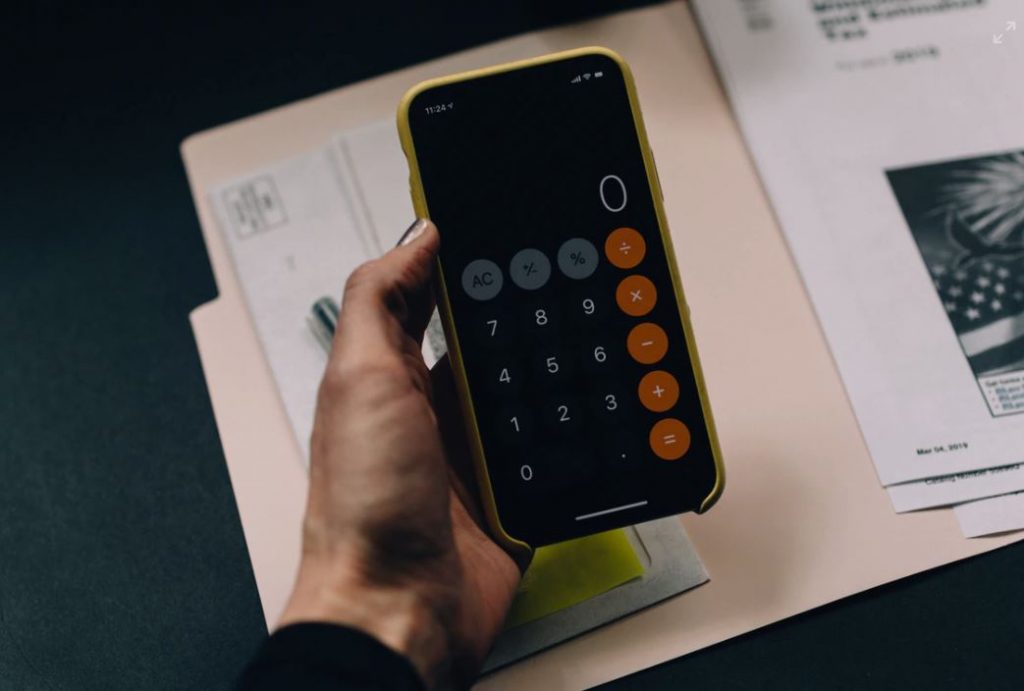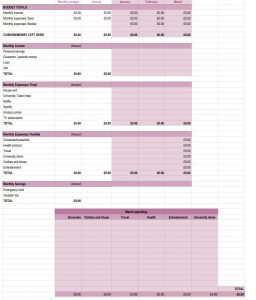
Student Advice: Budgeting and Saving Money
Written by Fanny Bois-Berlioz, 2nd Year BA Architecture
“As a student in the UK, you might be receiving a loan from the government and it can seem like a lot of money coming into your bank account at once. There are various ways you can start to budget your money and learn how to save without restricting too much.
Create an excel spreadsheet
- This might sound like a very daunting task but creating a spreadsheet (as shown below) with your income, spending, and savings will be so helpful once you learn how to use it properly. At first, when I started writing down all my expenses I only felt like it was just showing how much I spent and I still did not save money. However, with time I became really aware of my spending and did not fear to open my bank account every week or did not have to transfer money from my savings multiple times a week because I knew exactly how much money was coming in and out.
- Seeing over a couple of months where you spend more or less money can help you to allocate a certain budget for each category, such as groceries, entertainment, university items etc… Naturally, I started to want to save more money and felt like I had more control over my expenses

Calculate all your incomes
- Once you have created your spreadsheet add up all your incomes, whether it is your loan, a scholarship, money from a guarantor or parents, and savings that you want to use now.
- Subtract all your “fixed” expenses that will come up every month such as tuition fees, accommodation rent, insurances, your credit card, a TV or music subscription, bills etc.
- By doing so you will roughly have an idea of how much you can spend on your “flexible” expenses. If you realize then that it leaves you with little money each month, think about a way to share these fixed expenses with a friend such as a TV or music subscription, house bills etc that can be paid by more than one person.
Categories of spending
- It is great to have a fixed budget for each category such as groceries, equipment for university, travel, social activities, clothes etc. You can give yourself a certain budget for each depending on how much you usually spend on groceries etc.
Saving money
- Cooking with friends: You may find it difficult to make groceries by yourself without worrying about how much to buy and if the food will go bad in your fridge. A great tip I have learned is to make food with your housemate or flatmate by buying ingredients together and splitting the cost. This can also help to have more diversity in your meals by being able to make new recipes often without wasting food.
- Buy second-hand: For clothing, books, furniture, and bikes it may be really helpful to look up websites such as E-bay, Depop, and Vinted where you can find used items at a reasonable price, hence saving a lot of money. Similarly, you can sell clothes that you don’t wear or books you have read!
- Student discount: The apps Student Beans or Unidays are great to receive discounts on websites and restaurants too. Whenever you want to make a purchase online you will probably be able to get 10% off your order with a student discount promo code. Also, a lot of chain restaurants in the UK make offers for students which can be great if you want to go out without worrying about money.
- Travel: As much as it is very tempting to commute by bus nowadays, you can maybe find different ways to go to University or to Town that will cost little to no money. In Manchester, the new bikes around the campus cost £0.05 a minute and the electric ones £0.10. If I were to take the bus from Victoria Park to University Place it would cost me around £2.50 whereas by using the bikes I take around 10 minutes to cycle and it costs me roughly £0.5 which is incredible to save money and time.”






0 Comments